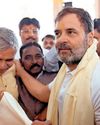
In the theatrical release, Adieu Godard, directed by Amartya Bhattacharyya, Ananda, an uneducated, lanky old man in a remote village in Odisha, is addicted to pornography. He cycles long distances every day to bag DVDs of porn films with deceptive covers. He then watches it at home with his crew of four, much to the chagrin of his wife and grown-up daughter. One day, a DVD fails to do its job, and instead plays the French cult classic Breathless, directed by Jean-Luc Godard. Annoyed that the film offered “no song, dance, fight and romance”, Ananda’s friends diss him, but he remains captivated by the film. The chance encounter turns Ananda into an Godard fan and he decides to introduce the French filmmaker to his village in order to “make people think and open up their minds”. Ananda’s fascination with Godard bears semblance to Bhattacharyya’s fascination with the iconoclastic French filmmaker who is known to have championed a spontaneous, resolutely modern, intensely free and just-pick-up-a-camera-and-start-shooting style of filming. Godard died earlier this month at the age of 91 by assisted suicide.
The 123-minute-long film comes across as a tribute to the world’s most acclaimed directors, known for classics that broke conventional notions and helped kickstart a new way of filmmaking with handheld cameras, jump cuts and existential dialogues. Godard’s famous line, “A movie should have a beginning, a middle, and an end, but not necessarily in that order” became the byword of the new wave movement, and his influence spread far and wide, including in India.
Denne historien er fra October 02, 2022-utgaven av THE WEEK India.
Start din 7-dagers gratis prøveperiode på Magzter GOLD for å få tilgang til tusenvis av utvalgte premiumhistorier og 9000+ magasiner og aviser.
Allerede abonnent ? Logg på
Denne historien er fra October 02, 2022-utgaven av THE WEEK India.
Start din 7-dagers gratis prøveperiode på Magzter GOLD for å få tilgang til tusenvis av utvalgte premiumhistorier og 9000+ magasiner og aviser.
Allerede abonnent? Logg på

Use multi-asset investing to overcome portfolio volatility
EQUITY MARKETS have been choppy during this year. After rallying for the better part of the first nine months of 2024, equities corrected sharply in October and November, before taking off once again on rally mode in December.

Twist of faith
Upamanyu Chatterjee is back with his wry sense of humour in his new novel, and most of it is directed at religion and spirituality

THE GLORY OF SARI
Saris of Memory weaves together history and textiles, highlighting key moments from the author's collection

We win together
We invented chess, which was pretty cool of us. The original game 'chaturanga'that is four divisions (infantry, cavalry, elephantry and chariotry)-was a war strategy game. When the game travelled to the Middle East, they mangled the Sanskrit and it ended up being called 'shatranj' instead.

BEATS THAT HEAL
Music ignites the light within us, says Grammy-winner Chandrika Tandon

Older, smarter, sexier
Those who worship him regardless of where he works have continued to do so. Such is the power of Alessandro Michele, that after being the face of some mega brands for 10 years (namely Gucci and now Valentino), he remains bigger than the labels themselves. His debut collection for Valentino was presented at the recent Paris Haute Couture Week, and it has been adored by his adorers.

The road to peace
Future political dialogues should explore means of ensuring a more robust autonomy to tribal communities

Diary of a Sherpa
Amitabh Kant's new book is a comprehensive account of the G20 Summit held in Delhi in 2023

The annoying orange
Everything is great. All is sunshine. I am an eternal optimist.\" It's the fad of our TikTok times everything is not great, the sun sets daily, nothing is eternal. If anything, everything is ephemeral, night brings darkness, and optimism often crumbles under the weight of history. British philosopher Roger Scruton warned: \"Hope untempered by the evidence of history is a dangerous asset, one that threatens not only those who embrace it, but all those within range of their illusions.\"

NO SEAT, YET UPBEAT
The Congress is buoyed by its increased vote share in Delhi, and feels it can push the AAP into further decline